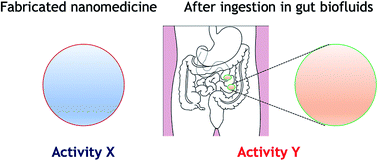Nanoparticle modification in biological media: implications for oral nanomedicines
Abstract
Nanomedicine has shown potential in enabling oral administration of poorly absorbable drugs, such as biologics. As part of the process related to optimisation of the safety and efficacy of nanomedicines, it is imperative that the interaction of nanoparticles with the biological systems – including the gut – is fully characterised. In this article, we provide an overview of the major mechanisms by which nanoparticles may transform upon introduction in biological media. Specifically, the phenomena of association, dissolution and biomolecule adsorption are discussed, together with factors which influence the occurrence of each phenomenon. The implications of these phenomena within the context of therapeutic action of nanomedicines, which includes reduced targeting efficiency, are also explored. Finally, we will comment on nanoparticle modification within the gut environment, including the currently available gastrointestinal models for the study of nano-bio interactions, with implications in the area of nanomedicines for oral administration.



 Please wait while we load your content...
Please wait while we load your content...